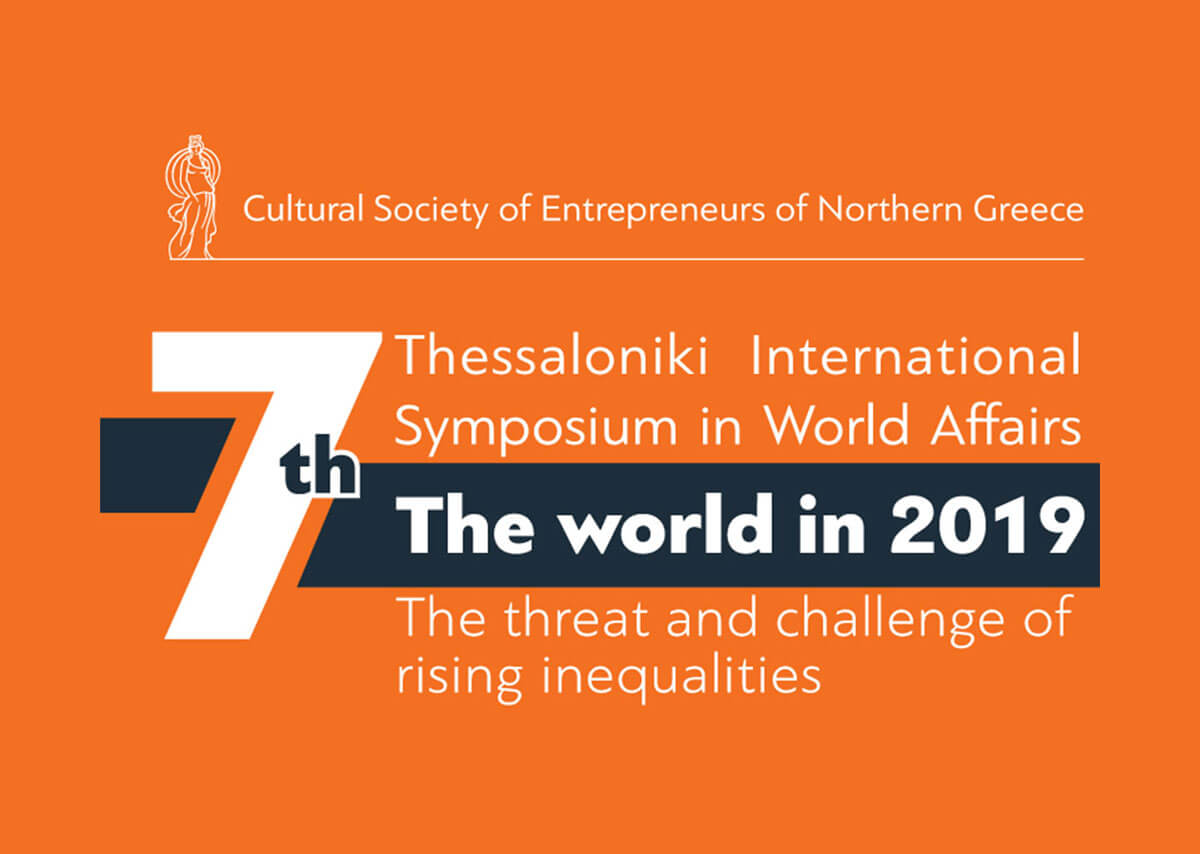Agenda
7th Thessaloniki International Symposium in World Affairs
The world in 2019: The threat and challenge of rising inequalities
Thessaloniki, October 21, 2018 Olympion, Aristotelous Square 10
10:00 – Registration
10:30-10:50 – Welcoming remarks
- Dimitris Keridis, Director, Navarino Network
- Stavros Andreadis, Chairman, The Cultural Society of Entrepreneurs of Northern Greece
- Yiannis Boutaris, Mayor of Thessaloniki
- Henri Bohnet, Head of Greece Office, Konrad-Adenauer-Stiftung
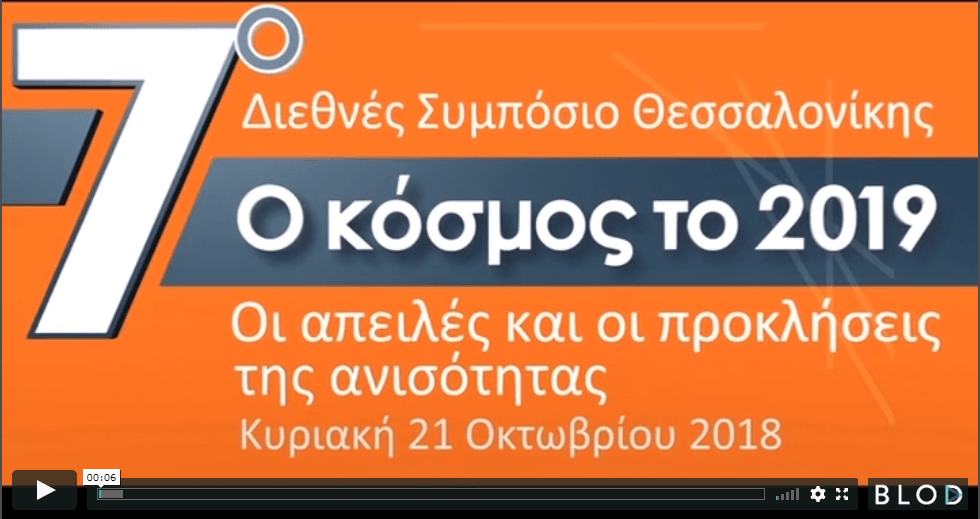
10:50 – 14:00 – Europe in a world of power redistribution
- Part A
Moderator: Dimitris Keridis
10:50 – The challenges for Europe ahead
- Christos Stylianides,
EU Commissioner, Humanitarian Aid & Crisis Management, Brussels
(via teleconference)

Speaker’s short bio
Christos Stylianides is the European Commissioner for Humanitarian Aid and Crisis Management since November 1st, 2014.
On October 24th, 2014 he was appointed by the European Council EU Ebola Coordinator. He was elected Member of the European Parliament in the May 2014 European elections where he served until October 31st 2014.
He was twice appointed Government Spokesperson of the Republic of Cyprus (in 2013-2014 and in 1998-1999).
During the period 2006-2013 he served as a Member of the Cyprus House of Representatives (elected in 2006 and 2011).
During his tenure he served as Vice-Chair of the Committee on Foreign and European Affairs (2011-2013) and member of the Committee on European Affairs, the Committee of Internal Affairs and the Committee of Employment and Social Affairs (2006-2011).
Between 2006-2011 he was a member of the OSCE Parliamentary Assembly and he was elected Member of its Bureau in 2012.
11:00 – The making, unmaking and remaking of Europe
- Edmond Alphandery,
former Minister of Economy, France (1993-1995)
Founder and Chairman, Euro50 Group, Paris
Speaker’s short bio
Edmond Alphandéry is founder and Chairman of the Euro 50 Group which gathers leading European personalities concerned with monetary policy of the European Central Bank.
A Board member of ENGIE (former GDF SUEZ), he is the President of its Strategic Committee. Edmond Alphandéry is also a Senior Advisor of NOMURA and sits on the Consultative Committee of A.T. KEARNEY, France.
He attends the Consultative Committee of the Banque de France. From 1993-1995 he worked as a Minister of the Economy of France.
From 1998 to 2012, Mr. Alphandéry served as chairman of CNP Assurances, and prior to this appointment, he was chairman of Electricité de France (EDF).Edmond Alphandéry is the author of numerous articles and books devoted to economic and monetary affairs.
11:20 – In search of German leadership: The view from Berlin/Munich

Speaker’s short bio
Stefan Kornelius is foreign editor of Süddeutsche Zeitung. He is coordinating foreign coverage for the paper and contributing editorials and columns, mainly on European, US, transatlantic and security issues.
In his reporting career, Kornelius served as Washington Bureau Chief (1996-1999) and political correspondent from Bonn, where he covered Chancellor Kohl and the governing CDU.
Kornelius holds a masters degree from the London School of Economics. He won several journalism awards, mainly for commentary and opinion.
His recent foreign policy biography on the Chancellor (“Angela Merkel – die Kanzlerin und ihre Welt”) was published in 13 languages.
11:40 – Gender inequality: How bad is it in Europe?
- Laura Albu,
Vice President, European Women’s Lobby, Brussels

Speaker’s short bio
Laura Albu is Vice President of the European Women’s Lobby in Brussels.
Since 2000, as CEO of the Community Safety Mediation Center (CMSC) she has coordinated more than 25 programs related to social services.
She has also coordinated projects focused on violence against women, equality between women and men, women in politics and decision making, women in rural areas, women in poverty and migrant women.
Since 2000, she was actively involved in promoting new legislation in the field of violence against women in Romania and conflict resolution.
She represented Romania in the European Observatory on Violence Against Women and she is a member in numerous NGOs, committees and networks.
As an expert working directly in the field, she is deeply committed to gender equality and respect for diversity.
11:55 – Discussion
- Part B
Moderator: Henri Bohnet
12:15 – EU – a Czech/Central European perspective:
How to find common purpose again after the financial and migration crises
- Lukas Macek,
Director, Sciences Po Paris, Dijon, France

Speaker’s short bio
Born in Prague in 1976, Lukáš Macek studied in France between 1992 and 1999.
He graduated at Science Po Paris with specialization for European affairs.
Since 2004 he has been the director of European undergraduate program at Science Po Paris in Dijon.
His teaching experience includes namely Charles University in Prague, New York University in Prague and Sciences Po. His publishing activity is focused on the EU institutional affairs and the Enlargement policy (papers for various think-tanks, contribution to Czech and French media, a book on the EU enlargements published by La Documentation française in 2011).
Previously he worked as assistant and advisor to several Czech politicians, especially to senator Josef Zieleniec, former Foreign affairs minister, and Jan Švejnar, presidential candidate in 2008.
He served also as secretary of the Czech Senate delegation to the European Convention (2002-03). He was actively involved in several political campaigns, as an advisor or as a candidate (Senate elections 2000; referendum on the EU accession 2003, European elections 2004 and 2009, Presidential election 2008).
12:35 – What are the lessons learned and the risks ahead for post-communist Europe?
- Anders Aslund,
Professor, Georgetown University
Senior Fellow, Atlantic Council, Washington, D.C.
(via teleconference)

Speaker’s short bio
Anders Åslund is a resident senior fellow in the Dinu Patriciu Eurasia Center at the Atlantic Council. He also teaches at Georgetown University. He is a leading specialist on economic policy in Russia, Ukraine, and East Europe.
Dr. Åslund has served as an economic adviser to several governments, notably the governments of Russia and Ukraine (1994-97). He is chairman of the Advisory Council of the Center for Social and Economic Research, Warsaw, and of the Scientific Council of the Bank of Finland Institute for Economies in Transition. He has published widely and is the author of fourteen books.
Previously, he worked at the Peterson Institute for International Economics, the Carnegie Endowment for International Peace, the Brookings Institution, and the Kennan Institute for Advanced Russian Studies at the Woodrow Wilson Center.
He was a professor at the Stockholm School of Economics and the founding director of the Stockholm Institute of East European Economics. He served as a Swedish diplomat in Kuwait, Poland, Geneva, and Moscow. He earned his PhD from Oxford University.
12:45 – Greece and Southeastern Europe after the refugee/migration crisis
- Gerald Knaus,
Founding Chairman, European Stability Initiative, Berlin

Speaker’s short bio
Gerald Knaus (Austria) is the founding chairman of the European Stability Initiative (ESI), a think tank with offices in Berlin, Brussels, and Vienna working on South East Europe and the Caucasus, European enlargement and the future of EU foreign policy.
He studied in Oxford,Brussels and Bologna, taught economics at the State University of Chernivtsi in Ukraine and spent five years working for NGOs and international organisations in Bulgaria and Bosnia and Herzegovina.
From 2001 to 2004, he was the director of the Lessons Learned Unit of the EU Pillar of the UN Mission in Kosovo. In 2011, he co-authored, alongside the British MP Rory Stewart, the book “Can Intervention Work?”.
He wrote scripts for award-winning TV documentaries on South East Europe (www.returntoeurope.eu, 2008-2012) and co-authored many ESI reports on EU enlargement, the Balkans, Turkey and the Caucasus, including “Islamic Calvinists – Change and Conservatism in Central Anatolia” (2005), “Caviar Diplomacy – How Azerbaijan Silenced the Council of Europe” (2012), and most recently “The Merkel Plan” (2015) and “The Rome Plan” (2017) on the refugee crisis and “The European Swamp” (2016) on corruption in the Council of Europe.
He is a founding member of the European Council on Foreign Relations and was for five years an Associate Fellow at the Carr Center for Human Rights Policy at Harvard University’s Kennedy School, where he was also a Visiting Fellow in 2010/2011 lecturing on state building and intervention.
In 2016/2017 he was a Mercator-IPC Senior Fellow in Istanbul. He is based in Berlin and Istanbul and writes the Rumeli Observer blog.
13:05 – Greece and Europe after the crisis
- Daniel Gros,
Director, Centre for European Policy Studies, Brussels
(via teleconference)
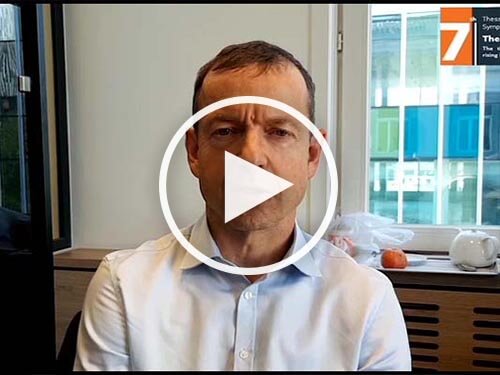
Speaker’s short bio
Daniel Gros has been the Director of the Centre for European Policy Studies (CEPS) since 2000.
Among other current activities,he has worked for the International Monetary Fund, and served as an economic adviser to the European Commission, the European Parliament, and the French prime minister and finance minister. He is the editor of Economie Internationale and International Finance.
Daniel Gros holds a PhD. in economics from the University of Chicago and is the author of several books and numerous articles in scientific journals.
His main areas of expertise are the European Monetary Union, macroeconomic policy, economics of transition to a market economy, public finance, banking and financial markets.
13:10 – Greece: The vulnerable link, still?
- George Pagoulatos,
Professor of European Politics and Economy, Athens University of Economics and Business, Athens
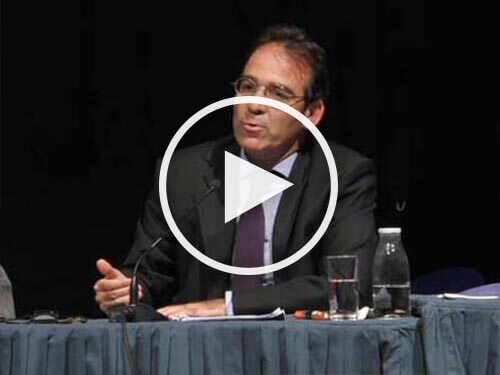
Speaker’s short bio
George Pagoulatos is Professor of European Politics and Economy at the Athens University of Economics and Business (AUEB), and Visiting Professor at the College of Europe in Bruges. He was Senior Advisor and Director of Strategy at the PM Office under Prime Ministers Lucas Papademos and P. Pikrammenos during 2011-12.
He is a member of the Board of Directors of the Athens-based Hellenic Foundation for European and Foreign Policy (ELIAMEP) and the Brussels-based European Policy Centre (EPC), and board member of various academic and civic organizations.
He served as member of the High Council of the European University Institute in Florence (2010-13), and President of ECSA-Greece (2013-14). He is a regular columnist in the Sunday edition of the main centrist newspaper Kathimerini since 2007.
Pagoulatos holds degrees from the University of Athens and the University of Oxford, where he was a Rhodes Scholar. His research and publications focus on the EMU and the EU, Southern European and Greek political economy, economic governance, political economy of banking and finance, political economy of reform.
He has extensive experience in providing advice and analysis on the Greek political economy.
13:30 – Discussion
14:00-15:00 – Lunch break
15:00-15:45 – Turkey under President Erdogan
- Moderator: Sofia Papadopoulou, Journalist, Head of ANA-MPA’s Northern Greece Directorate, Thessaloniki
Discussant: Dimitris Keridis
15:00 – Turkey between Europe and the Middle East: After thwarted ambitions and challenging realities in search of a direction
- Soli Ozel,
Visiting Fellow in International Relations, Institut Montaigne, Paris

Speaker’s short bio
Soli Özel holds a BA in Economics from Benningon College (1981) and an MA in International Relations from Johns Hopkins University School of Advanced International Studies (SAIS-1983).
Mr. Özel is currently a full-time Professor at Kadir Has University. He is also a columnist at Habertürk Daily newspaper. He has guest lectured at Georgetown, Harvard, Tufts and other US universities, taught at UC Santa Cruz, SAIS, University of Washington, Hebrew University and held fellowships at Oxford, the EU Institute of Strategic Studies and was a Fisher Family Fellow of the “Future of Diplomacy Program” at the Belfer Center of the Kennedy School of Government at Harvard University.
In the Spring of 2013 he was a Keyman fellow and a visiting lecturer at Northwestern University.
From 2015 to 2017 he was a Richard von Weizsacker fellow at the Robert Bosch Academy in Berlin. He is a regular contributor to German Marshall Fund’s web site’s “ON Turkey” series.
His work has been published in Internationale Politik, Journal of Democracy, Foreign Policy, International Security, Wall Street Journal, Financial Times, New York Times, The Guardian, Bitterlemons-International. He is a member of the European Council on Foreign Relations.
15:20 – Turkey’s foreign policy posture
- Akif Kireçci,
Assistant Professor, School of Economics, Administrative and Social Sciences, Bilkent University, Ankara
(via teleconference)
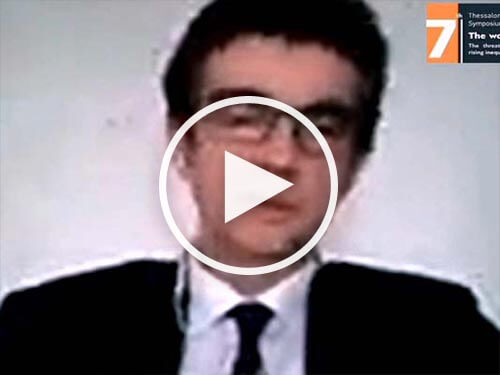
Speaker’s short bio
Akif Kireçci is Assistant Professor at Bilkent University and Advisor for National Security and Foreign Policy to the President of the Republic of Turkey. He received his PhD from the Near East Studies Department of the University of Pennsylvania in the United States.
He has taught at the same university and worked as a lecturer at the Stevens Institute of Technology. He conducts research on the history and politics of the nineteenth and twentieth centuries of the Middle East, intellectual movements, Turkish foreign policy, Islam, modernity, Orientalism and cultural transformations.
He is also Chairman of the Ankara Center for Political and Economic Research, Deputy Chairman of the National Commission for UNESCO and the Fulbright Commission Board Member of Turkey.
15:25 – Discussion
15:45-16:45 – Greece after the crisis: Rebound or decline?
- Moderator: Dimitris Keridis
15:45 – Greece in the 21st century: The challenge ahead
- Kyriakos Pierrakakis,
Director of Research, diaNEOsis, Athens

Speaker’s short bio
Kyriakos Pierrakakis is a PhD candidate in Political Economy at Heidelberg University. He is a graduate of Harvard University (Master of Public Policy), MIT (Master of Technology Policy) and Athens University of Economics and Business (Bachelor of Computer Science).
He is research director of the research and analysis organization “diaNEOsis”. He has worked as a teacher and innovation co-ordinator at the AIT, as President of the Youth Institute, as a consultant at the Ministry of Development, Competitiveness and Shipping and as a researcher at the Centre for American Progress in Washington and the Centre for Energy Policy and Environmental Policy Research at MIT.
Dr Pierrakakis has scientific publications in journals and conference proceedings on issues of international political economy, technology policy and political science. He is a co-founder of a technology company, assistant researcher at Mannheim Centre for European Social Studies (MZES) and Athens University of Economics and Business (Information Security and Critical Infrastructure Protection Laboratory).
16:05 – Technology and innovation: The new frontier for Greece
- Marco Veremis,
Co-founder & Executive Chairman, Upstream
Founding Partner, BigPi Venture Capital, Athens
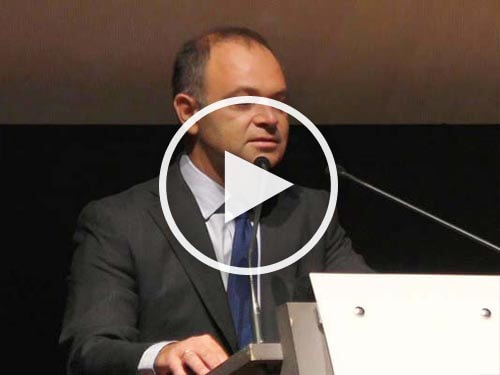
Speaker’s short bio
Marco Veremis was born in Athens, in 1973. He holds a BA in Politics and International Studies from the University of Warwick and an MPhil in European Studies from Oxford University. He started his career in 1996 as a marketing strategist at leading advertising agencies Grey Advertising, McCann-Ericsson and DDB in London, where he developed global communication strategies for brands such as Nestle, Smithkline Beecham, Johnson & Johnson and Sony Electronics.
In 2002, he returned to Greece and, along with Alex Vratskides, co-founded Upstream. Since then, Upstream has evolved into a leading technology company within the field of mobile commerce operating in 42 countries with a turnover of 250 million euros and 380 employees.
Marco served as Upstream’s CEO until June 2017 and is now Chairman of the Board and Partner at BigPi Venture Capital. Marco is an active angel investor and member of the board in technology companies such as Persado, Workable, Intellibox, Procureship and Hellas Direct.
In parallel, Marco is a mentor at Endeavor and a board member of the Foundation for Economic and Industrial Research (IOBE), and diaNEOsis think tank. He also sits in the start-up and export committees of the Hellenic Federation of Enterprises (SEV).
He has served as Vice-Chairman of the Hellenic Association of Mobile Application Companies (HAMAC), a mentor at Openfund and received the EY Greek “Entrepreneur of the Year” award, in 2013.
16:25 – Cyber-security: A new concern
- Despina Spanou,
Director for Digital Society, Trust and Cybersecurity, European Commission, Brussels
(via teleconference) (tbc)
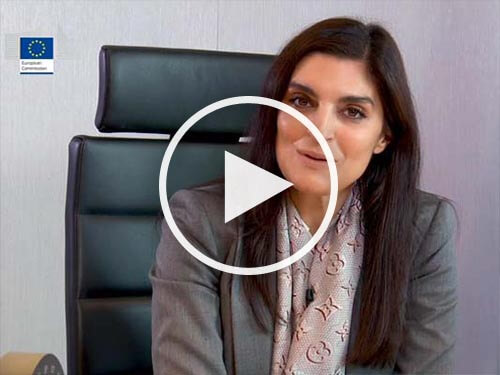
Speaker’s short bio
Despina Spanou is the Director for Digital Society, Trust and Cybersecurity at the Directorate-General Communications Network, Content and Technology.
In this capacity she is responsible for cybersecurity policy and law, digital privacy, connected cities and mobility, digital health and e-government as well as electronic identification. She was previously Director for Consumer Affairs at the Directorate-General for Justice and Consumers (2013-2017) in charge of consumer policy, consumer and marketing law, redress and enforcement, and product safety.
She was the Deputy Head of Cabinet for the European Commissioner for Health and Consumers Mr. Kyprianou (2004-2008) and for the Commissioner for Health, and later Education & Culture, Mrs. Vassiliou (2008-2010).
Despina Spanou started her career at the European Commission at the Directorate General for Competition in 2003.
16:30 – Discussion
16:45-17:55 – Euro-elections 2019: Regressing or moving forward?
- Moderator: Maria Bozoudi, Professor, American College of Thessaloniki
16:45 – EU challenges and the need for a New Pact for Europe
- George Pagoulatos,
Professor of European Politics and Economy, Athens University of Economics and Business, Athens
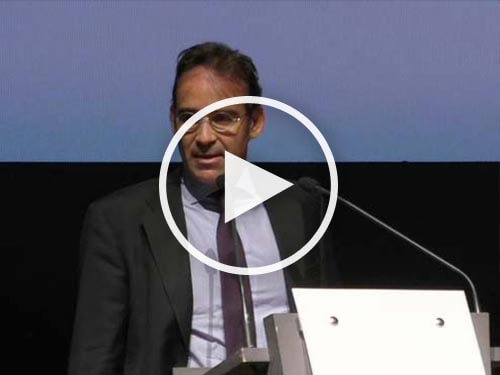
Speaker’s short bio
George Pagoulatos is Professor of European Politics and Economy at the Athens University of Economics and Business (AUEB), and Visiting Professor at the College of Europe in Bruges. He was Senior Advisor and Director of Strategy at the PM Office under Prime Ministers Lucas Papademos and P. Pikrammenos during 2011-12.
He is a member of the Board of Directors of the Athens-based Hellenic Foundation for European and Foreign Policy (ELIAMEP) and the Brussels-based European Policy Centre (EPC), and board member of various academic and civic organizations. He served as member of the High Council of the European University Institute in Florence (2010-13), and President of ECSA-Greece (2013-14). He is a regular columnist in the Sunday edition of the main centrist newspaper Kathimerini since 2007.
Pagoulatos holds degrees from the University of Athens and the University of Oxford, where he was a Rhodes Scholar. His research and publications focus on the EMU and the EU, Southern European and Greek political economy, economic governance, political economy of banking and finance, political economy of reform.
He has extensive experience in providing advice and analysis on the Greek political economy.
17:05 – Threats and challenges of the 2019 elections for the European Parliament
- Donatella Viola,
Assistant Professor in Politics and International Relations, University of Calabria, Italy
Speaker’s short bio
Donatella M. Viola, PhD in International Relations from the London School of Economics and Political Science, London, UK, is Assistant Professor in Politics and International Relations at the University of Calabria, Italy.
Formerly Robert Schuman Scholar at the Directorate-General of the Secretariat of the European Parliament in Luxembourg and Marie Curie Fellow at the London School of Economics, she has researched and lectured in several British and American academic institutions in the UK: Universities of Bristol, Cardiff, Leeds, London, Plymouth, Regent’s College and the Richmond American International University in London.
In addition, Donatella M Viola has been Visiting Professor at the Academy of European Public Law EPLO in Greece, TEI-Serres, Greece, University of Malta and ‘Friedrich-Alexander’ Universitat (FAU) of Erlangen-Nuremberg, Germany as well as Visiting Scholar at the College of Europe – Bruges, Belgium.
Finally, she has given seminars and lectures at the European University Institute, Florence, ‘John Cabot’ University Rome, LUISS, Bocconi, Florence, Turin, Messina and ‘Mediterranea’ Universities in Italy as well as at the ‘Aristotle’ University of Thessaloniki, Greece.
Editor and main contributor of the Routledge Handbook of European Elections, Routledge, 2016, 2018 as well as author of the monograph European Foreign Policy and the European Parliament in the 1990s, An Investigation into the Role and Voting Behaviour of the European Parliament’s Political Groups, Ashgate, 2000. Her other publications cover: elections to the European Parliament; national parliaments; enlargement of the European Union; conflicts in the Gulf and Former Yugoslavia; European Constitution; EU immigration and environmental policies.
17:25 – Εuropean elections 2019: Towards a clash of visions?
- Anna Diamantopoulou,
President, “DIKTIO” Network for Reform in Greece and Europe, Athens
former EU Commissioner, Brussels
(via teleconference)
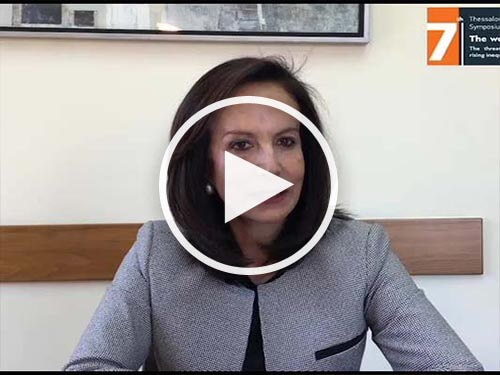
Speaker’s short bio
Anna Diamantopoulou is a Civil Engineer by training with graduate studies in Regional Development and has been a member of the Greek Parliament for 11 years. In 1999 she was appointed as European Commissioner for Employment, Social Affairs and Equal Opportunities (1999-2004).
In 2009 she served as Minister of Education, Lifelong Learning and Religious Affairs until March of 2012, and consequently as the Minister of Development, Competitiveness and Shipping until May 2012.
Anna Diamantopoulou is active in European affairs. She is Presidium Member of the “Friends of Europe”, the Brussels-based think tank exploring thinking on the future of the EU, and a Steering Committee Member of “Notre Europe-Jaques Delors Institute” the Paris-based think tank dedicated to European integration and unity.
She has also served as the Chairperson of the Party of European Socialists’ Forum on the European Dimension of New Social Europe.
She has served as a Fisher Family Fellow (2012) of the Harvard Kennedy School lecturing on European Affairs, and as a Distinguished Scholar at Singapore’s Lee Kuan School of Public Policy (2015).

